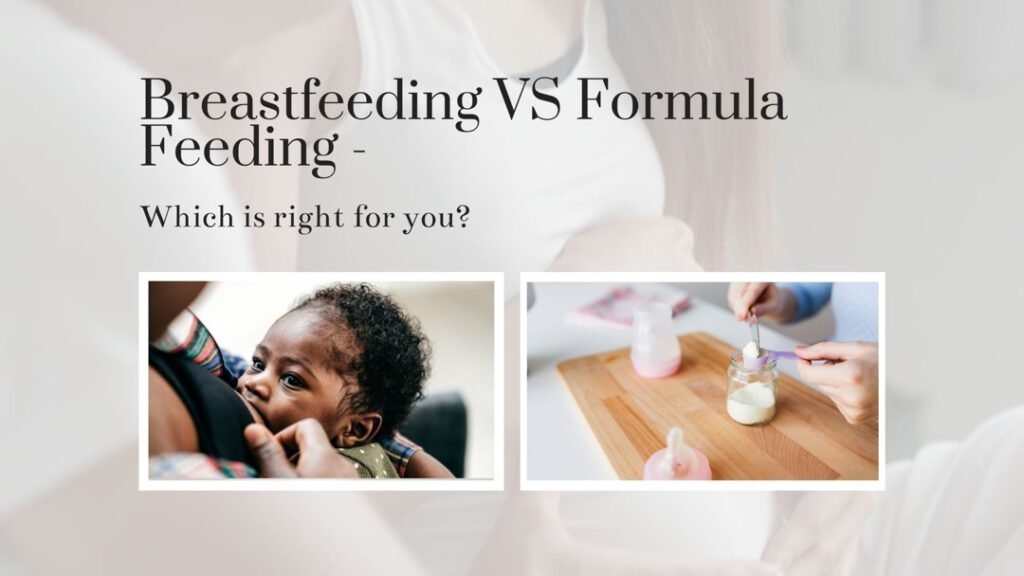Choosing between breastfeeding and formula feeding is one of the biggest decisions new parents face. You want what’s best for your baby, but with so much conflicting advice, it can feel overwhelming. The truth is, both feeding options have their own set of benefits and challenges. Some parents prefer breastfeeding for its natural health benefits, while others opt for formula feeding due to convenience and flexibility. This guide will break down the pros and cons of breastfeeding and formula feeding, helping you make an informed choice that suits your baby and lifestyle.
Breastfeeding vs. Formula Feeding: Key Differences
Before diving into the pros and cons of breastfeeding and formula feeding, let’s explore how they differ:
- Breastfeeding is the natural way to feed a baby, providing optimal nutrition directly from the mother’s body.
- Formula feeding uses commercially prepared infant formula, designed to mimic breast milk while offering a convenient alternative.
While both methods nourish your baby, factors like health benefits, cost, convenience, and lifestyle considerations play a role in deciding which option works best.
Pros and Cons of Breastfeeding
Breastfeeding Benefits
- Superior Nutrition – Breast milk contains the perfect balance of nutrients, antibodies, and enzymes that support a baby’s growth and development.
- Stronger Immunity – One of the key advantages of breastfeeding vs. formula feeding immunity is that breast milk boosts the baby’s immune system, reducing infections and illnesses.
- Easier Digestion – When comparing breastfeeding vs. formula feeding digestion, breast milk is gentler on a baby’s stomach and reduces the risk of constipation or colic.
- Reduced Allergies – Studies show that breastfeeding vs. formula feeding allergies favors breastfeeding, as it lowers the risk of food allergies and sensitivities.
- Emotional Bonding – Many mothers feel a stronger emotional connection due to the skin-to-skin contact in breastfeeding vs. formula feeding bonding.
- Lower Cost – In the breastfeeding vs. formula feeding cost comparison, breastfeeding is free, making it a more budget-friendly option.
Breastfeeding Disadvantages
- Time Commitment – Breastfeeding requires frequent feeding sessions, which can be demanding, especially for working mothers.
- Diet Restrictions – Mothers may need to avoid certain foods that can affect the baby.
- Public Perception – Breastfeeding vs. formula feeding public opinion varies, and some mothers feel uncomfortable breastfeeding in public.
- Physical Discomfort – Some women experience nipple pain, engorgement, or mastitis.
Pros and Cons of Formula Feeding
Formula Feeding Benefits
- Convenience – Comparing breastfeeding vs. formula feeding convenience, formula feeding allows both parents to share feeding duties.
- More Freedom for Mothers – Ideal for working mothers, as it allows flexibility in scheduling.
- Easier to Monitor Intake – Parents can track exactly how much their baby is consuming.
- Longer Sleep Gaps – In sleep patterns, formula-fed babies tend to sleep for longer periods between feeds.
Formula Feeding Disadvantages
- Costly – Formula feeding is significantly more expensive when considering breastfeeding vs. formula feeding cost comparison.
- Lacks Antibodies – Unlike breast milk, formula doesn’t provide immune-boosting properties.
- Digestive Issues – Comparing breastfeeding vs. formula feeding digestion, formula can be harder to digest, sometimes causing gas or constipation.
- Possible Allergies – Babies fed formula may develop dairy or soy allergies.

Additional Considerations
Nutritional Differences
Breast milk is naturally designed to meet a baby’s changing needs, while formula provides consistent but artificial nutrition. Breastfeeding vs. formula feeding nutritional differences highlight that while formula is enriched with vitamins and minerals, it lacks live antibodies.
Health Outcomes
Studies show health outcomes favor breastfed babies, with lower risks of obesity, diabetes, and infections. However, formula-fed babies can also grow up healthy with proper nutrition and care.
Societal Perceptions
The debate on breastfeeding vs. formula feeding societal perceptions remains strong. While breastfeeding is often encouraged, formula feeding is widely accepted and supported.
Final Thoughts: Making the Best Choice for Your Baby
Ultimately, there is no one-size-fits-all answer. Breastfeeding vs. formula feeding is a personal choice influenced by your lifestyle, medical history, and preferences. Whether you choose to breastfeed, formula feed, or do a combination of both, the most important thing is that your baby is well-fed, loved, and thriving.
For more related articles, Click here



